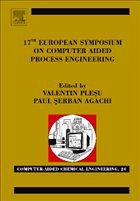The 17th European Symposium on Computed Aided Process Engineering contains papers presented at the 17th European Symposium of Computer Aided Process Engineering (ESCAPE 17) held in Bucharest, Romania, from 27-30 May 2007.
The ESCAPE series serves as a forum for scientists and engineers from academia and industry to discuss progress achieved in the area of Computer Aided Process Engineering (CAPE). The main goal was to emphasize the continuity in research of innovative concepts and systematic design methods as well the diversity of applications emerged from the demands of sustainable development. ESCAPE 17 highlights the progresss software technology needed for implementing simulation based tools.
The symposium is based on 5 themes and 27 topics, following the main trends in CAPE area: Modelling, Process and Products Design, Optimisation and Optimal Control and Operation, System Biology and Biological Processes, Process Integration and Sustainable Development. Participants from 50 countries attended and invited speakers presented 5 plenary lectures tackling broad subjects and 10 keynote lectures. Satellite events added a plus to the scientific dimension to this symposium.
- All contributions are included on the CD-ROM attached to the book
- Attendance from 50 countries with invited speakers presenting 5 plenary lectures tackling broad subjects and 10 keynote lectures
Table of contents:
Content Headings
Plenary Lectures
Process Systems Engineering and CAPE What Next?(R. Gani, I.E. Grossmann).
Reactive and Hybrid Separations of Chemicals and Bioactive Substances: Modeling and Optimization,
(A. Górak).
Crystal Engineering for Product and Process Design(M.F. Doherty).
Among the Trends for a Modern Chemical Engineering: CAPE an Efficient Tool for Process Intensification and Product Design and Engineering (J.-C. Charpentier).
Perspectives for Process Systems Engineering - a Personal View from Academia and Industry (K.-Ulrich Klatt, W. Marquardt).
Theme 1. Modelling in CAPE - New Horizons
Theme 2. Products and Processes Design
Fundamentals
Theme 3. Optimisation and Optimal Process Control and Operation
Theme 4. Systems Biology and Biological Processes
Theme 5. Process Integration and Sustainable Development
The ESCAPE series serves as a forum for scientists and engineers from academia and industry to discuss progress achieved in the area of Computer Aided Process Engineering (CAPE). The main goal was to emphasize the continuity in research of innovative concepts and systematic design methods as well the diversity of applications emerged from the demands of sustainable development. ESCAPE 17 highlights the progresss software technology needed for implementing simulation based tools.
The symposium is based on 5 themes and 27 topics, following the main trends in CAPE area: Modelling, Process and Products Design, Optimisation and Optimal Control and Operation, System Biology and Biological Processes, Process Integration and Sustainable Development. Participants from 50 countries attended and invited speakers presented 5 plenary lectures tackling broad subjects and 10 keynote lectures. Satellite events added a plus to the scientific dimension to this symposium.
- All contributions are included on the CD-ROM attached to the book
- Attendance from 50 countries with invited speakers presenting 5 plenary lectures tackling broad subjects and 10 keynote lectures
Table of contents:
Content Headings
Plenary Lectures
Process Systems Engineering and CAPE What Next?(R. Gani, I.E. Grossmann).
Reactive and Hybrid Separations of Chemicals and Bioactive Substances: Modeling and Optimization,
(A. Górak).
Crystal Engineering for Product and Process Design(M.F. Doherty).
Among the Trends for a Modern Chemical Engineering: CAPE an Efficient Tool for Process Intensification and Product Design and Engineering (J.-C. Charpentier).
Perspectives for Process Systems Engineering - a Personal View from Academia and Industry (K.-Ulrich Klatt, W. Marquardt).
Theme 1. Modelling in CAPE - New Horizons
Theme 2. Products and Processes Design
Fundamentals
Theme 3. Optimisation and Optimal Process Control and Operation
Theme 4. Systems Biology and Biological Processes
Theme 5. Process Integration and Sustainable Development

